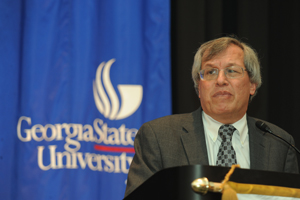Closing the Courthouse Doors
February 15, 2012
ATLANTA – In case after case over the last year, influential scholar Erwin Chemerinsky told an audience of more than 400 people at Georgia State University on February 9, the U.S. Supreme Court is closing the courthouse doors to those who want to sue corporations or the government, criminal defendants who want to bring federal habeas corpus petitions, and plaintiffs who claim injuries of all sorts.
Chemerinsky, founding dean and distinguished professor of law at the University of California, Irvine School of Law, was at GSU as a guest of the College of Law to deliver the 50th Henry J. Miller Distinguished Lecture. (Watch the lecture video »)
 Chemerinsky went through several cases to illustrate his point, saying the cases are representative, not atypical. For each of the categories he went through, Chemerinsky said he could show other examples just from the Roberts Court. The pattern is significant, he said, and it's important to note that virtually all of the cases he talked about are 5-4 decisions, almost all ideologically divided. All make it much harder for individuals to be able to get their day in court.
Chemerinsky went through several cases to illustrate his point, saying the cases are representative, not atypical. For each of the categories he went through, Chemerinsky said he could show other examples just from the Roberts Court. The pattern is significant, he said, and it's important to note that virtually all of the cases he talked about are 5-4 decisions, almost all ideologically divided. All make it much harder for individuals to be able to get their day in court.
"There is widely accepted in this country, the principle that people who are injured will get their day in court," Chemerinsky said. "We take this very seriously and yet, when you think what the Roberts Court has been doing, that's not as so as it used to be. For those who want to sue corporations, for those who want to sue the government, for prisoners who want to have access to habeas corpus or plaintiffs who have suffered injuries, in area after area, what the Supreme Court is doing is slamming the courthouse doors closed."
Chemerinsky previously taught at Duke Law School for four years, during which he won the Duke University Scholar-Teacher of the Year Award in 2006. Before that he taught for 21 years at the University of Southern California School of Law, and served for four years as director of the Center for Communications Law and Policy. Chemerinsky has also taught at UCLA School of Law and DePaul University College of Law.
His areas of expertise are constitutional law, federal practice, civil rights and civil liberties, and appellate litigation. He is the author of seven books, most recently, The Conservative Assault on the Constitution (October 2010, Simon & Schuster), and nearly 200 articles in top law reviews. He frequently argues cases before the nation's highest courts, and also serves as a commentator on legal issues for national and local media. Chemerinsky holds a law degree from Harvard Law School and a bachelor's degree from Northwestern University.
The Henry J. Miller Distinguished Lecture Series is sponsored by the Charles Loridans Foundation.
Contact:
Wendy Cromwell
Director of Communications
404.413.9050
You do not have the version of Flash needed to view this media. The latest version of the Flash Player is free software available for immediate download from the Adobe website. Please download and install it to view this media.
If you are still receiving this message after you have installed the latest version of Flash, you may need to close and reopen your browser to view this content.